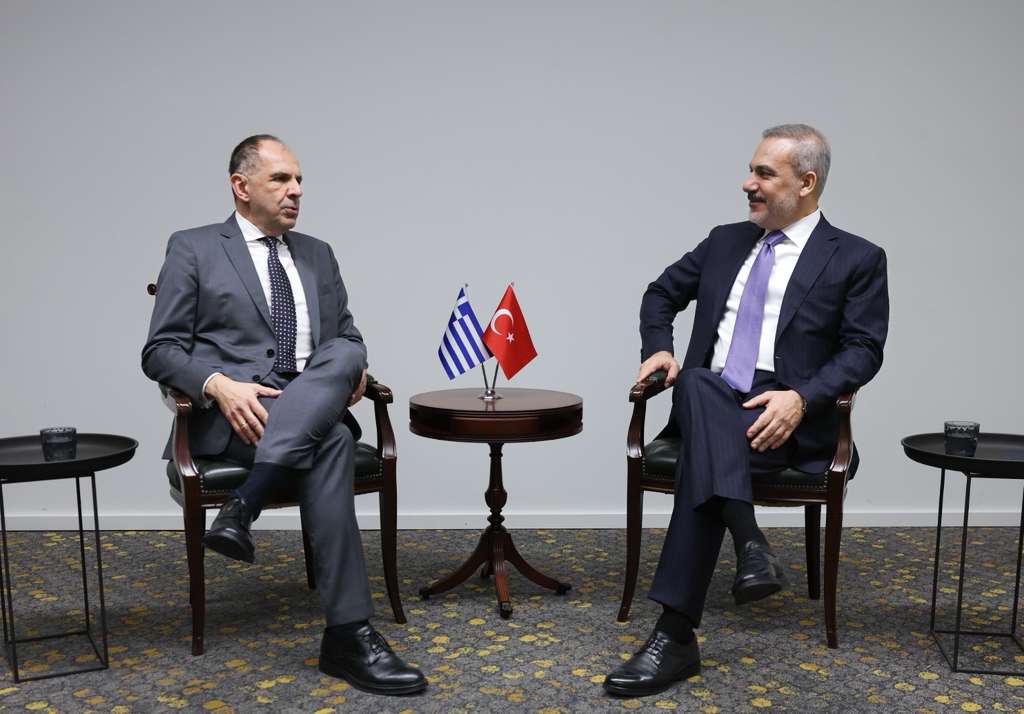The recent statements by Turkish Foreign Minister Hakan Fidan bring back to the forefront a chronic issue that concerns Greek-Turkish relations. The diplomatic confrontation between Ministers Gerapetritis and Fidan highlights the importance of extending Greek territorial waters for the geopolitical balance in the region.
Turkey has been repeating for decades the argument of the “Greek lake” when referring to the Aegean Sea. According to the Turkish view, the exercise of the Greek right to extend territorial waters to 12 nautical miles would restrict Turkish navigation. However, the Greek side has never referred to excluding any country from international navigation. The steady Greek position, regardless of the government in power, remains unchanged: the right to extend territorial waters is inalienable and non-negotiable. The timing of exercising this right will be determined by the Greek side when deemed necessary.
Until 1972, Turkey maintained territorial waters of 6 nautical miles in the Aegean and 12 nautical miles in the Mediterranean and Black Sea, without making unilateral moves. Turkey’s current claims against Greece appeared during the 1970s, marking a new period in bilateral relations. Since 2023, the year when Greek-Turkish relations improved following the devastating earthquake in Turkey, there has been increased interest in the territorial waters issue. The earthquake brought the two peoples and political leaderships closer together, creating opportunities for dialogue.
Turkish references to “gradual extension” of territorial waters have become more frequent since Foreign Ministers Gerapetritis and Fidan assumed office. Rumors of behind-the-scenes negotiations circulate in diplomatic circles, while the Athens Declaration in December 2023 further strengthened speculation about possible developments.
Turkey’s “window” for gradual territorial waters in the spotlight
The issue returned to the forefront in recent days. Developments in Greek-Turkish relations were intense, indicating that something is beginning to move. It started when the Prime Minister proposed organizing a Conference of Coastal Countries in the region with the so-called “5×5” format, with participation from Greece, Cyprus, Egypt, Turkey and Libya and five thematic cooperation areas: Migration, marine environment protection, connectivity, maritime zone delimitations and civil protection. An ambitious step that, however, hides many “thorns.” Turkey, for example, does not accept sitting at the same table with Cyprus, even though Tayyip Erdogan and Nikos Christodoulides have coexisted in international forums (Budapest and Qatar). On the opposite side, Greece sets Cyprus’s participation as an inviolable condition, which it considers non-negotiable. There are other problems, such as the non-inclusion of other neighbors (Egypt, Italy and Israel).
Divided Libya, which has not yet been led to elections, also constitutes a major asterisk. The Foreign Ministry has undertaken to explore the prospects for implementing this scheme. “The country has self-confidence (…) and not only does it not fear, but seeks understanding with all neighboring states,” declared Kyriakos Mitsotakis from the Parliament podium. Gerapetritis has already raised the 5×5 Conference with his Turkish counterpart during their face-to-face meeting in Luxembourg, on the sidelines of the EU Foreign Affairs Council. Specifically, G. Gerapetritis emphasized that establishing such a cooperation scheme becomes useful due to major geopolitical realignments worldwide.
Greece will not be satisfied with a goodwill gesture, nor will it be carried away by artifices, but will continue to demand complete lifting of the casus belli
Gerapetritis: Sovereignty issues off the table
Given the opportunity, the Greek minister repeated to H. Fidan that the delimitation of Exclusive Economic Zone and continental shelf is the one and only difference between Greece and Turkey, emphasizing that sovereignty issues are off the table. This, because a few hours earlier, in his interview, the Turkish minister had said he believes we can find common ground somewhere… in the middle, making mutual concessions. “I don’t accept 12 miles, you don’t accept 6 miles. When there is will, these issues are resolved. But everyone fears the following: ‘If I solve this, might it cost me power?'” said Mr. Fidan, referring to the political cost that accompanies such an agreement. The very experienced Dora Bakoyannis, speaking on Open, stated that, since the Greek-Turkish discussion about our difference will concern the continental shelf and EEZ, it must start somewhere. Obviously meaning (including) territorial waters. While commenting on Mr. Fidan’s statements, she interpreted them as a “small opening,” indicative that “Turkey is returning to Helsinki,” as she characteristically said.
Generally, Athens read the Turkish minister’s position -and the fact that he did not mention the casus belli this time- as a sign of rapprochement by Ankara. However, because the competent officials at the Foreign Ministry have no illusions, they are not complacent. As they characteristically told the author, it could not be ruled out that this was a communication trick by Turkey to show Europeans a more moderate stance, so that obstacles to its integration into European defense, specifically the SAFE program, would be removed. Well-informed sources emphasized to our newspaper that Athens will not be satisfied with a goodwill gesture nor will it be carried away by artifices. It will continue to demand complete lifting of the casus belli.
Published in Sunday Afternoon




